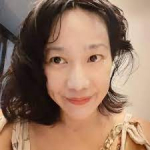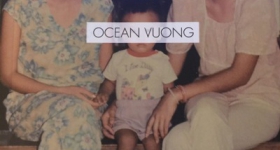C Pam Zhang’s novel, How Much of These Hills Is Gold, recounts the journey of two siblings, Lucy, 12 and Sam, 11, at the end of the American Gold Rush in the 1800s and their individual struggles to transform and survive. The prize-winning novel, long-listed for the 2020 Booker Prize and a finalist for the PEN/Hemingway Award among other honors, covers issues around race, gender, mythology and immigration in American history — themes especially resonant today given recent anti-Asian American hate crimes.
This interview has been edited for length and clarity.
Dana Liu: First let's talk about borders. Your novel is grounded in history and has been labeled a historical novel, but you have clarified that it's a reimagining. It has a lot of surreal aspects, including the landscape, as well as a deliberate absence of actual dates. Can you explain the idea behind these choices?
C Pam Zhang: One thing that I've thought a lot about is that I have a broader definition of history and mythology than is conventionally used. I think those two terms overlap a great deal more than we tend to acknowledge. As a kid growing up in an American school system, I believed that history was a collection of completely objective facts. I didn't think at that time about the narratives that people who wrote history books were deliberately constructing, and for the majority of the time in America, it’s been white men constructing those historical narratives. When I think about the way that vibrates with the term ethnology, for example, I think of the mythology of the cowboy. This idea that Westerners have such a huge cultural imprint in America and yet in reality, right, cowboys only existed for maybe 20 years. I like to think my book exists somewhere between those terms as well. It is a reimagining of history in many ways, but I also argue that history itself is just a cultural myth that we continue to tell and hopefully update over the years and through the generations, as new facts are brought to light. Because so much is missing or willfully obscured, history is not that different from mythology. So that's just a long way of saying that I feel like my novel falls somewhere between the two.
When I think about the mythologies that enraptured me when I was a child, what I loved about mythologies and related genres like fairy tales is that they exist in this place that feels a little outside of time. Timeless is another way you can refer to them. And by existing in that sort of liminal space, that fuzziness allows the reader to have a more intimate, personal connection with the tale. The fact that certain place names or dates or facts are a little bit funny makes it easier for them to feel universal, and that was another effect that I sought to have in this book. I wanted it to truly feel like a mythological underpinning.
DL: Can we talk about the characters of Lucy, Sam and Ma? How do race and gender play into their narratives and the ways Asian American women are generally exoticized while the men are emasculated? Can you also talk about the restrictions and limited choices your female characters faced in their desire for empowerment?
CPZ: One harmful story that's always been told about Asian women in America, since the very first Asian women arrived at the shores, is the story of Asian women as exotic sexual objects, right. There's been a lot of talk this year about the Chinese Exclusion Act in 1882, but fewer people know about the Page Act of 1875, which preceded the Chinese Exclusion Act and specifically excluded Chinese women. The pretext was that Asian women were immoral and would bring immorality into the country because they were all prostitutes. The history of anti-immigrant rhetoric in this country cannot be disentangled from the general association of Asian women as sex objects. This paved the way for the Chinese Exclusion Act (1882), which set precedence for many more decades and centuries of anti-Asian immigrant legislation. I think it’s become painfully clear this past year with the rise not only of anti-Asian hate crimes, but also (and it’s not really a spike because it's happened for so long) the heightened visibility of the killing of Black men in America. All of our destinies as marginalized people in this country are entangled and legislation that harms one group is always being used to wedge the door shut against other groups. So I think that it is useful to talk about the harm done by fetishizing Asian women and to think about how this plays into that larger tapestry of legislative bigotry in this country.
I think it's really insightful that you picked up on how women, especially Asian American women who are sexualized, sometimes turn to that kind of power or semblance of control in a world in which they're given very little power. I think the initial seduction is part of Lucy’s story. I hesitate to call that power, because it's not true power in the way that white men in this book have power, but at the same time when you're constantly backed into a corner, sometimes you look at the smaller tools available to you, which in this case is the exotification and sexualization by the culture, and you think about how you can use them. Especially for a young girl who knows very little about the world, at first that kind of power is thrilling and intoxicating, and you can think that you are free by wielding it.
One harmful story that's always been told about Asian women in America, since the very first Asian women arrived at the shores, is the story of Asian women as exotic sexual objects...I think that it is useful to talk about the harm done by fetishizing Asian women and to think about how this plays into that larger tapestry of legislative bigotry in this country.
DL: You’ve observed that the white myth of the “American dream” is something that looks beautiful but is really toxic and is the tension at the heart of your novel. Do ideas of solidarity come into your novel?
CPZ: You know, it was hard because the world of the novel is obviously not the world of 2021, and the characters of the novel don't perfectly espouse my personal views in 2021. So, as a writer, I was deeply aware of having to straddle this line when I wrote the book, of simultaneously needing to preserve the authenticity of the novel world (a world that is even more overtly bigoted and racist and sexist than our world today), but also wanting to show these flashes of solidarity or progressiveness that are really important. Frankly, it’s just empathy. One way I got to do that is through the oppositional nature of the two main characters, Lucy and Sam. In some ways, there's a little bit of myself in every one of the family members in this novel. One of the themes I was trying to get through in the character of Lucy, through whose eyes we see most of the novel, is this idea that it's her desire to be assimilated into whiteness. It’s the desire that so many Asian Americans today and throughout history really understand, that if we behave well enough and adhere to the rules of whiteness, we will one day be allowed in ourselves. We have been forcibly pressured into buying into the model minority myth. And so we see Lucy espousing whiteness and subjugating herself to it but also the emotional toll it has on her. It eats away at her psychically, even while at this point in the book, she has all these creature comforts because she is aligned with whiteness. On the flip side, through the character of Sam, I wanted to show the opposite, as someone who looks at the rules and structures of the world and rejects them. Sam has an unyielding internal compass for injustice, so we see Sam fall into solidarity with Native, Black and other marginalized workers later in the book. Sam is the character who has the courage to throw off some of the shackles of the world. But at the same time, it wasn't realistic to write a character who boldly straps forth and suffers no consequences. Sam, unfortunately, may be emotionally or psychically liberated, but is often in much greater physical danger than Lucy. It was important to me to show both this solidarity and this empathy across different marginalized groups, and also to show the cost of it, which is the fault of this world and system they're born into.
DL: Your novel has been compared to Toni Morrison, Cormac McCarthy, William Faulkner. I can see the comparisons. The hauntings. The haint – an old Southern word for ghost. I love this language of the West, how words are metabolized into the setting and the landscape. Is the use of the spectral a literary thing or some feeling of being haunted by the past?
CPZ: I think it's impossible at this point to disentangle my direct literary influences from just my own obsessions. I will say, I've always been really drawn to the idea of the supernatural and of ghosts because in some way I think that I've always grown up with an awareness of what's missing from the world around us. That may be as literal as actual ghosts and spirits haunting us. I think about living in Northern California and every year seeing these successive waves of wildfires, and in every history class in elementary school being reminded of which Native tribes used to live here and what they used to eat and their traditions. It's impossible for me to inhabit America or most any part of the world without being aware of what's been lost, what's been stolen and what's been wrested at the cost of blood. So I think that is one of the reasons why I find myself obsessed with this idea of ghosts, which are the most literal interpretation of something that is missing but still having a presence.
DL: Are you still looking for a home now? And how have the recent anti-Asian hate crimes affected your sense of identity and your writing?
CPZ: I have to confess that so many writers I know in America feel like we yo-yo between rightful anger with a desire to help change this country and frustration with an attitude that maybe we'll leave it behind and fantasize about going somewhere with health care.
I can't say that I've fully answered the question of where home is and where I belong. But I will say that I didn't become a naturalized U.S. citizen until I was 16, even though I lived in the United States from the age of 4. And I will say that the feeling of righteous anger is something that is deeply American, something that you only feel when you feel like you belong to a country or a country belongs to you. My partner is not an American citizen, and we've spoken many times about how he doesn't feel that he has the same sort of right as I do to speak up or become furiously angry or protest in the street. And so, at the same time that I feel this ambivalence about being an American living in America, I want to hold on to this idea that challenging the very foundations of this country is part of what makes us American.










Comments